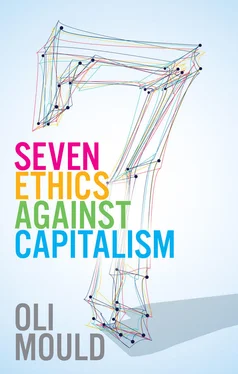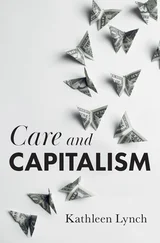Planetarity is less thinking the world as the same than celebrating its difference. It is a rejection of the powerful forces that seek to homogenize the world into an abstract consumption product so as to improve the bottom line. Instead, being ‘planetary’ widens our aesthetic and ideological gaze, and views the world as a multiplicity of cultures, people, places and things, all held together in balance, against a capitalism that is very much im balanced. A planetary commons, then, is not one that is global (that would be to the detriment of the local), nor is it international (that would be to fall back on existing geopolitical structures that continue to fail us). Hence, configuring the commons as planetary acknowledges their infectious and contagious characteristics and highlights how they spread to those realms of social life that have been ravaged by capitalism.
On a practical level, this requires safeguarding and protecting what we have created in common throughout the millennia (and continue to create), but not in the way that is currently done via institutional forms. To shift our focus on the commons to a planetary conceptualization requires an understanding of not only what it is that we create by being together, but how an empirically new form of society can be brought into being that realizes a common world that can be safeguarded from the violence of capitalism. So, more than affirming a simple ‘stewardship’ of the world’s resources (which can often slip into neo-colonial contexts that order society around those who qualify to be stewards and those who do not), a planetary commons denotes a far more intimate connection with those resources we seek to protect.
But in the midst of a powerful, all-pervasive enclosure by capitalism, how is the ideology of a planetary commons to survive? Is the idea of the commons forever to be marginalized? How can the spirit of Heraclitus, the materiality of the Diggers, the political imaginary of the Paris Commune, the economic rationality of Ostrom, the shared cultural internationalism of Hardt and Negri’s multitude thrive?
The answer that this book propounds is to rekindle an ethics of the commons and reconceptualize it as not just a potential enclave of resistive anti-capitalism (which of course is important), but as more: as a creative, and infectious force of planetary commoning independent of capital. As Gibson-Graham have argued, if the commons is thought as a verb, then its emancipatory potential is further unleashed. By establishing community-based protocols that articulate access and use, but also taking a careful and thoughtful approach to resources and distributing them in a way that focuses on the most in need first, then these acts of ‘commoning’ become a way of engendering the imbued prosperity of earth’s resources for all. In short, a planetary commons needs to continually be ‘alive’ and look to move with the needs of the people and community it is serving, all the while bringing more people in. As soon as the commons becomes static, rigid and steeped in institutional wrangling, it runs the risk of falling back into capitalistic modes of operating.
So adding the term planetary to the commons forces an expanded ontology, one that takes seriously the materiality of the commons and our inextricability from it, as well as its ethical potential. Elias and Moraru denote the ‘ethical’ nature of planetarity as infectious; a contagious way of being-in-the-world. Put bluntly, political activism is inherent in the commoning practice. The more strongly activism attempts to bring additional people and things into its ideological orbit, the more ethical potential it has. Configuring the commons as planetary, then, demands a focus on its infectious, contagious and activist characteristics and highlights how it can spread to those realms of social life that have hitherto been ravaged by capitalism.
This book therefore attempts to tease out the kinds of ethics that can aid in the flourishing of a planetary commons. It does so by offering a suite of carefully identified ethics that has the potential to articulate what a flourishing of a planetary commons may look like, what kind of characteristics it may enliven. And so the next question to ask is ‘what does it mean to be ethical?’
As Elias and Moraru have intimated, being ethical is part of the conceptualization of planetarity. It is the infectiousness of the commoning procedure. This is an important starting point for thinking ethically, but how can we be ethical? The word ‘ethics’ is used in many fields. There are medical ethics, which operate to guide physicians and other health professionals in their work. All new doctors are required to take the Hippocratic oath, stating that they will do no harm and putting patients’ needs above any other consideration (with or without personal protective equipment). There are legal ethics, which are a set of codified rules, often enshrined in particular national legal frameworks and enforced by dedicated institutions. Within the university context, there are research ethics that each project has to adhere to. Students are given ethics forms to fill out when they are proposing their dissertations. There are business ethics that often appear as ‘codes of conduct’ that a corporation may (or may not) choose to enforce on its employees. People even talk about corporate ethics, which are a tacit ‘agreement’ of sorts that companies and costumers will enter into when transacting. None of these are the ethics that this book will focus on. In fact, these ‘ethics’ are the antithesis of the kind of ethics that will be explored.
This book builds on the idea of ethical thinking as infectiousness, but colours this with the conceptualization of ethics as immanent, and not beholden to any predefined higher power. Essentially, ethics are allowing for the continuation of commoning . Hence, they are not a ‘code of conduct’, but a suite of positionalities that catalyse a planetary commons wherever and however they unfold in real time. If commoning is the realization that an oppressive ideology can be resisted, then ethics are ‘soft articulations’ of how to maintain this resistance. Ethics therefore are ‘immanent’ and always unfolding, rather than some suite of transcendental ideals that are predefined. They take stock of a situation, and are subsequently articulated depending on how the commoning is unfolding. To be ‘ethical’ in this sense is to be guided by the given situation in all its diversity, density and difference, rather than any preconceived or external ‘guide’. Such ethics are fleeting in action, but can become more durable and embedded in the world as they diffuse through the social fabric. This reading of ethics is in the tradition articulated most forcefully by the French radical philosopher Gilles Deleuze, in his sole-authored work but also in the magnum opus he wrote with his co-conspirator Félix Guattari. 26In intricately analysing the notion of ethics within this work, the feminist philosopher Tasmin Loraine has argued that ‘Deleuze and Guattari’s conceptualisation of an immanent ethics calls on us to attend to the situations of our lives in all their textured specificity and to open ourselves up to responses that go beyond a repertoire of comfortably familiar, automatic reactions and instead access creative solutions to what are unique problems.’ 27
The ‘problem’ of capitalism is far from unique – it is global in its imposition – yet an ethics that aims to resist the myriad of injustices and inequalities can follow the same immanence outlined by Deleuze and Guattari. In other words, opening up spaces to allow recognition and indeed a celebration of the different forms of living justly in this world, beyond the totalizing hegemonic force of capitalism, is an ethical act.
Читать дальше












